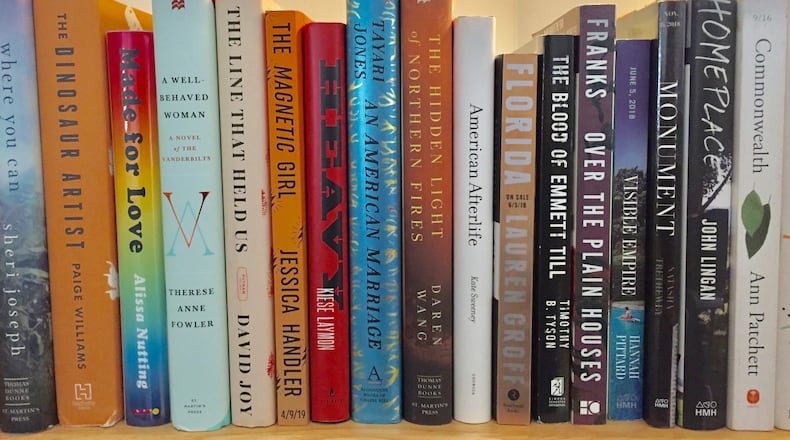We are living in tumultuous times and the publishing industry reflects that. Political polarity, climate change, racial disparity and gender identity are topics that dominate the nonfiction market right now. Perhaps that's one reason Helen Ellis' second collection of humor essays, "Southern Lady Code," stands out. We could all use a little levity right now.
Ellis, who made her debut in 2016 with the best-seller “American Housewife,” is a refreshing entry into the annals of women humor writers that includes Nora Ephron, Erma Bombeck and, locally, Hollis Gillespie. Despite the fact she lives in New York City, Ellis mines her Alabama heritage for all its worth, giving her essays a Southern spin that readers below the Mason-Dixon Line in particular will find relatable. She also is unabashed in her quest for a laugh. There are no lessons learned, no universal truths revealed. There’s no point in trying to determine how much truth her stories actually contain. Their singular goal is to make the reader laugh, and at that they mostly succeed.
That said, Ellis’ worldview is deeply rooted in privilege, so her stories are likely to resonate most with a similar demographic and possibly alienate those who don’t see the humor in paying $1,895 for a new Burberry trenchcoat when she already owns one but suspects it got switched at a party and now she can’t shake the dismay she feels when she wears it knowing someone else might have worn it. Ha-ha!
Some of the essays are undercooked, like “Halloween People,” an aimless account of shopping for a dress to wear to a black-tie party. But when Ellis is on, she is a delight. At her best, her essays are like being seated beside the most entertaining guest at a dinner party.
Like all good Southern storytellers, Ellis has a good ghost story to tell — several, actually, all compressed into one freewheeling essay that also involves a 500-piece puzzle of an owl in flight. “My family’s attitude toward ghosts is the same that we have toward hornets’ nests and noisy hotel neighbors: don’t bother them and they won’t bother you in a worse way than they are already bothering you. Ghosts are real. It’s the South. Our homes are built on battlegrounds and centuries-old horrors. Everybody’s house has some dead relative knocking around and rearranging the furniture.”
>> RELATED: 10 Southern books we want to read in 2019
In an homage to ‘50s-era advice books and magazine articles that targeted homemakers, several of Ellis’ essays are structured as lists of helpful tips with instructive titles, such as “How to Stay Happily Married” (“If your husband is loading the dishwasher, he’s loading it ‘right.’”); “How to Be the Best Guest” (“The Best Guest arrives on time and, from the moment she walks through the front door, spews compliments like a sprinkler … ‘Did you bedazzle those two dozen pinecones yourself?’”); and, in a nod to Ephron, “Seven Things I’m Doing Instead of a Neck Lift” (“When posing for a picture, I no longer say, ‘Cheese.’ I say, ‘Higher.’ … My best angle is taken by a hovering drone. Scroll through my albums and you’ll think I’ve been under NSA surveillance.”)
Her essay “A Room of One’s Own (Full of Gay Men)” celebrates Ellis’ friendships with gay men who embrace their sexuality. “Growing up in Alabama, there were no gay men. In my high school graduating class of 1988, certain boys were ‘shy’ or ‘respectful.’ ‘Artistic’ or ‘sensitive.’ Some ‘kept to themselves.’ This was all Southern Lady Code for something, but at the time, we girls weren’t exactly sure what.”
Rules about the Southern Lady Code, defined as “a technique by which, if you don’t have something nice to say, you say something not-so-nice in a nice way,” run throughout this slim, breezy book. In her essay “Free to Be … You and Me (And Childfree),” she observes, “’If it happens, it happens’ is Southern Lady Code for we don’t want kids.”
An anomaly among the collection is “Serious Women” about the murder trial of a woman charged with killing a pregnant acquaintance and removing the fetus, which survived, and trying to pass the child off as her own. Ellis attended the trial in part because she was friends with the prosecutor and wanted to show her support. The author thankfully does not try to find humor in the tragic events, but the point of the story remains elusive as does her reason for including it in this collection.
A better fit is “We’re Going to Party Like It’s 1979,” in which she dispenses with slaving all day over fancy hors d’oeuvres and serves her Upper West Side party guests Hawaiian Cheese Log and onion dip made from soup mix from recipes she finds in Junior League cookbooks. Or “How I Watch Pornography Like a Lady,” about her campaign against the public relations department of Twitter to scrub the social media platform free of pornography. Or “Peggy Sue Got Marijuana,” about her first experience smoking pot on Halloween night when “every kid’s costume was freaking fantastic and I made love to a box of super seed crackers.”
It’s when Ellis regales us with sassy observations about her daily exploits that her essays shine.
NONFICTION
‘Southern Lady Code’
by Helen Ellis
Doubleday
224 pages, $22
About the Author
Keep Reading
The Latest
Featured





